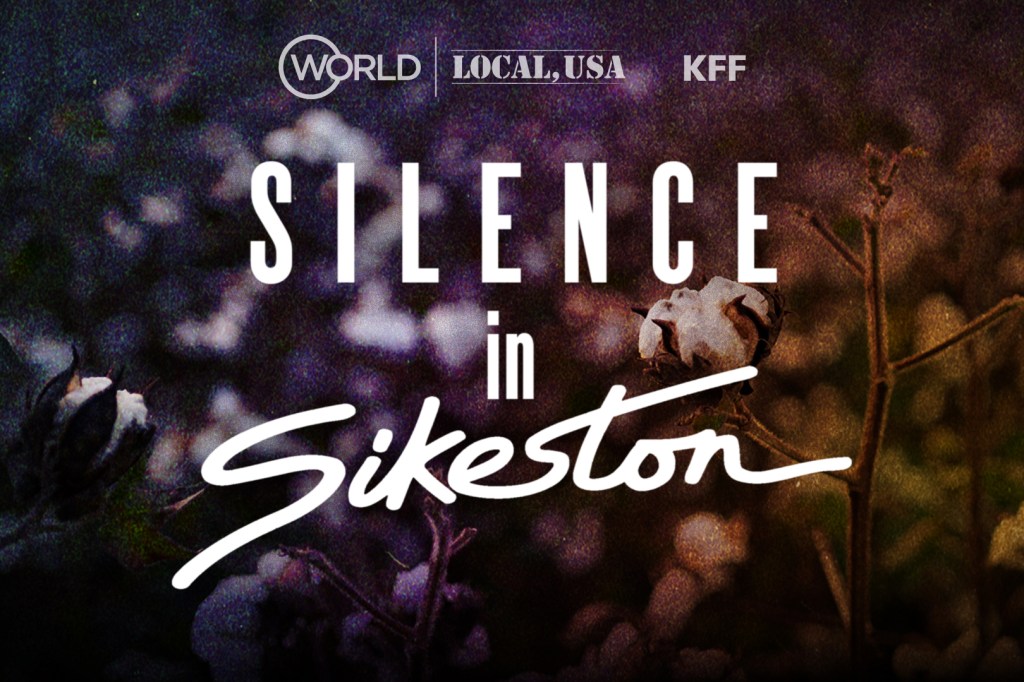Denzel Taylor, a young Black father, moved from Chicago to Sikeston, Missouri, for a fresh start in life. There, he proposed to his girlfriend, started a family, and then, in April 2020, was fatally shot by police officers. Taylor had two young daughters and another on the way when he was killed. Pediatrician Rhea Boyd talks about how children process such loss. Mental Health, Multimedia, Race and Health, States, Missouri, Podcasts, Silence in Sikeston KFF Health News
SIKESTON, Mo. — At age 79, Nannetta Forrest, whose father, Cleo Wright, was lynched in Sikeston, Missouri, before she was born, wonders how the decades-long silence that surrounded his death in 1942 influenced her life.
In 2020, Sikeston police killed another young Black man, 23-year-old Denzel Taylor. Taylor’s shooting death immediately made local headlines, but then the cycle of silence in Sikeston repeated itself.
Host Cara Anthony and pediatrician Rhea Boyd draw health parallels between the loss experienced by two families nearly 80 years apart. In both cases, young daughters were left behind to grapple with unanswered questions and devastating loss.
“Regardless of the age, children experience longing,” Boyd said. “They miss people when they don’t see them again; even babies can experience that.”
[Editor’s note: A swear word is bleeped out in this episode. The time stamp is 12:03.]
Host
Cara Anthony
Midwest correspondent, KFF Health News
Cara is an Edward R. Murrow and National Association of Black Journalists award-winning reporter from East St. Louis, Illinois. Her work has appeared in The New York Times, Time magazine, NPR, and other outlets nationwide. Her reporting trip to the Missouri Bootheel in August 2020 launched the “Silence in Sikeston” project. She is a producer on the documentary and the podcast’s host.
In Conversation With …
Rhea Boyd
Pediatrician and public health scholar
click to open the transcript
Transcript: Trauma Lives in the Body
Editor’s note: If you are able, we encourage you to listen to the audio of “Silence in Sikeston,” which includes emotion and emphasis not found in the transcript. This transcript, generated using transcription software, has been edited for style and clarity. Please use the transcript as a tool but check the corresponding audio before quoting the podcast.
[Solemn instrumental music begins playing softly.]
Cara Anthony: When Nannetta Forrest was growing up, a lot went unsaid in her family.
Nannetta Forrest: You know, people didn’t do a lot of talking back then. And it was almost like trying to pull teeth out of a hen.
Cara Anthony: She lived nearly her whole life in Indiana, but Nannetta’s story — the secrets and the silence — all started in Sikeston, Missouri.
Nannetta was born there in 1942. Several months earlier, while her mother was pregnant, Nannetta’s father was lynched.
His name … was Cleo Wright.
Nannetta Forrest: He was taken away before I got here!
Cara Anthony: Taken from a jail cell. Taken and dragged through the streets by a white mob. Taken to Sunset Addition, the center of Black life in Sikeston, and lynched. Taken from his family.
Nannetta’s mother kept quiet. She never wanted her daughter to know what happened to her father.
But one day, Nannetta was with her grandfather. A game show that aired on CBS in the 1950s was on TV. It was called “Strike it Rich.”
[Clip from “Strike it Rich” begins playing.]
“Strike It Rich” clip: Mr. “Strike It Rich” himself, Warren Hull. [Applause]
Nannetta Forrest: Celebrities would go on, and they’d try to win money for, like, underprivileged people.
“Strike It Rich” clip: Thanks a lot!
Nannetta Forrest: And that’s when Grandpa told me, he said, “You can go on there, Nan.” And I said, “Go on there with what?” And that’s when he went in his wallet and pulled out this yellow piece of paper.
[Solemn instrumental music plays.]
Cara Anthony: It was a newspaper clipping about the lynching of her father.
Nannetta Forrest: And that was my first time ever becoming aware of it.
Cara Anthony: It was around 1955. Nannetta was 13 or 14 at the time.
Nannetta Forrest: I did wanna know the story behind it, what happened, but nobody seemed to wanna talk about it.
Cara Anthony: Over the years, she pieced together bits of what happened. But there was always one nagging question that didn’t have an answer:
What would her life have been like if that mob hadn’t lynched her dad?
Nannetta Forrest: Now, I do often wonder that. Had he been alive when I was born and been in my life, what type of person would I have been? Would I have been the same person? Would I have been a different person? And this is something I’ll never know.
Cara Anthony: I’m Cara Anthony. I’m a health reporter.
I’ve traveled to Sikeston, Missouri, for years, asking people about the killing of Cleo Wright — and the silence that surrounds his death.
Nearly eight decades after the killing, that silence was still stifling. Like generations of stuffed-down fear and anger.
At nearly every turn, locals refused to talk to me. In fact, many people felt they could not talk to me. Until I met … Mikela Jackson.
[Solemn instrumental music fades out.]
Mikela Jackson: It’s … it’s … it’s no healing from grief. It’s an everyday thing for me.
Cara Anthony: Mikela goes by Keke. She’s in her mid-20s. But she’s heard about the lynching back in 1942.
Cara Anthony: Talk to me a little bit about that. Have you ever heard of Cleo Wright?
Mikela Jackson: Denzel brung that up to me. Denzel brung it up to me because we used to live on Sunset Street, and he was telling me, like, they dragged him through Sunset.
Cara Anthony: “Denzel” is Denzel Taylor, Keke’s fiancé.
Sikeston police shot him at least 18 times — and killed Denzel in April 2020. He was 23 years old.
That year, everyone was talking about new research that found that a Black man had a 1-in-1,000 chance of being killed by police.
Denzel Taylor became that 1 in a thousand.
[Sparse, minor music plays quietly.]
Right in the middle of her grief, Keke refused to be quiet.
Mikela Jackson: The Bootheel knows what happened to him. The world, they have no idea who Denzel Taylor is.
Cara Anthony: The Bootheel is where Sikeston sits — in the far southeast corner of Missouri.
Mikela Jackson: So that’s why I want his story … I wanna make him proud, actually. ’Cuz I want him to know, look, Babe, they going to hear this one way or another.
Cara Anthony: I made a film about the deaths of Denzel and Cleo — two Black men killed decades apart — in the same community.
For the documentary, we explored questions about the impact of racial trauma and the persistent harm it causes.
Here, for the podcast, we’re exploring another layer. How does systemic racial violence impact health? The health of Black people, in particular?
[“Silence in Sikeston” theme begins playing.]
Denzel’s story reminds me so much of Cleo’s. So many things about their lives — and their deaths — are similar.
They both left behind a daughter they never got to meet.
They both were killed by a public health threat of their time.
A threat to Black men of their time.
For Cleo, that was lynching.
For Denzel, it was police violence.
Neither of them got their day in court.
In this episode, we’re looking at what happened to Denzel Taylor.
We’re exploring police violence as a public health problem. One that’s making us sick and cutting lives short.
From WORLD Channel and KFF Health News, and distributed by PRX, this is “Silence in Sikeston,” the podcast about finding the words to say the things that go unsaid.
Episode 3: “Trauma Lives in the Body.”
[“Silence in Sikeston” theme ends.]
[Gentle, bright instrumental music plays.]
Cara Anthony: Denzel was from Chicago. Growing up, he spent time in southeastern Missouri with his dad’s family.
Denzel and Keke met in Sikeston. And Keke says they fell in love immediately.
Mikela Jackson: It was a butterfly feeling, like you could just tell it was love. It was the best energy ever.
Cara Anthony: They started their family. De’nia was born first. Denzel used to call her “Cupcake.”
Denzel Taylor: Hey, Cupcake. Say hey, y’all. I love you, princess. [Baby babbles.]
Cara Anthony: Aiyana came next. In 2020, Keke was pregnant with their third daughter, Brookelynn.
Mikela Jackson: He said he wanted seven kids. I said, Denzel, what? He wanted seven kids. That’s a basketball team. I can’t handle that.
Cara Anthony: They were planning to get married after Brookelynn was born.
Mikela Jackson: I really wanted a big family with Denzel. I wanted to get married. I wanted to go to D- … We was planning on moving to Dallas and everything and it’s just like, my whole world is just like, it just blew up on me.
Cara Anthony: Remember 2020? It felt like the news was full of stories about Black people getting killed by police.
Videos from body cameras were all over social media. Around that same time, Keke remembers Denzel getting pulled over by police more and more.
And, Keke says, he started to become convinced that someday he might be killed by police too.
Mikela Jackson: He said if he was to ever get in any type of interaction with the police, he would let them kill him just to show how America is.
He would bring it up, like, outta nowhere. And he would say it, and I would wonder, like, why is you constantly saying it? And I kind of will get irritated because it’s, like, that’s not a way that I will want you to go out. Like, we’re supposed to grow old together.
Cara Anthony: On April 29 that year, Denzel’s premonition came true.
Police body cameras captured what happened the night Denzel was killed.
You’re about to hear a retelling of what happened the night Denzel died — based on interviews with his family and audio pulled from those body cam videos.
When I first got the videos, I stared at the attachments in my email for a long time. I didn’t want to look.
[Soft droning music fades in.]
But I think it’s important that we do look at what happened. It’s part of what I have to do to examine police killings as a public health threat.
Denzel was staying with his father and his stepmom.
[Rain sounds play.]
It was raining that night. Denzel and his dad, Milton Taylor, were stuck in the house together.
They got into an argument. Things escalated.
Denzel’s mom, Jean Kelly, was asleep in Chicago some 400 miles away. In the early hours of the morning, Denzel’s sister ran into her room yelling.
Jean Kelly: “Mom, wake up.” I said, “What happened?” She said, “Denzel just shot Daddy.” I said, “What? Denzel just shot Daddy? That doesn’t make any sense at all.”
EMS audio: 49-year-old. Male. Gunshot wound. Two to three shots to the chest. Five officers on scene.
Cara Anthony: By the time police arrived at Milton’s home, Denzel had left. EMTs stabilized Milton and took him to the hospital.
EMS audio: We’re running hot. St. Francis. One patient.
Cara Anthony: Meanwhile, up in Chicago, Jean is trying to figure out what’s going on. She calls Milton’s wife, Denzel’s stepmom.
Jean Kelly: She said she had a couple of family members out looking for Denzel, you know, because she was saying, “I want them to find him before the police finds him.”
Cara Anthony: Police are speaking with Denzel’s stepmom when he appears.
The body-camera video shows the scene from an officer’s perspective.
[Music fades out.]
Cara Anthony: By now, it’s stopped raining. A streetlamp lights up the end of the block. Police had wrapped the area in yellow police tape. The camera shows Denzel standing in the near distance on the other side of the yellow tape. He’s wearing a hoodie.
Officers: Show me your hands now! Take your hand out of your pocket!
Denzel Taylor: Just kill me, bro.
Jean Kelly: They were saying, uh, “Put your hands up” or whatever the, the, they said to him, and there was some words exchanged. And, uh, it sounded like he said, “Well, shoot me, bro. Just go ahead, shoot me.”
Cara Anthony: The officers fire their guns.
Jean Kelly: They hit my son one time, I believe, if not two, and my son fell. He went, he dropped to his knees and fell face down.
Cara Anthony: There’s a pause. It’s just a moment or two, but as I watch it, it feels longer.
And then, the police fire again, sending bullets into his body on the ground. They keep shooting. You can hear dozens of shots.
Police body cam video: We got shots fired. We need EMS. We got one subject down, shots fired! Hands now! Hands! Hands!
Cara Anthony: One officer walks up — and uses his foot to roll Denzel the rest of the way onto his stomach. Denzel groans as the officer pins his arms behind his back and handcuffs him.
[Handcuffs click]
Cara Anthony: They search his body.
Police body cam video: Goddamn it.
Cara Anthony: Police don’t find a gun. Or any weapon. Just a piece of wood in his hoodie pocket.
Police body cam video: Are you [expletive] serious? He had a [expletive] stick of wood.
Cara Anthony: Police call for an ambulance.
EMS audio: … EMS respond to one subject shot. Time of page, 02 36.
Cara Anthony: On the body camera video, one officer points a flashlight in Denzel’s face.
Police body cam video: Why didn’t you just take your hand out of your pocket, man?
Cara Anthony: Minutes tick by. Red and blue police lights flash off the wet pavement. Denzel is still in the street, motionless.
[Ambulance sirens]
Cara Anthony: EMS arrive, but it’s too late. Denzel is dead.
Over the radio, the dispatcher calls for the coroner.
EMS audio: That’s yes, ma’am. Contact coroner. Ten-four.
[Somber instrumental music plays softly.]
Cara Anthony: Keke had been out of town. She got the call as she was driving back to Sikeston. The police had killed Denzel.
Mikela Jackson: And I said, “No, they did not. No, they did not.” I couldn’t believe it. It was heartbreaking.
Cara Anthony: A special prosecutor declined to file charges against the police officers who killed Denzel. The officers did not comment for this project. Sikeston Chief of Public Safety James McMillen says the officers believed Denzel was armed and that they were in fear for their life.
Denzel’s family sued the city of Sikeston. The city and the family reached a wrongful death settlement for $2 million. Close to half of it went to legal fees. Most of the rest of it will go to Denzel’s daughters.
Keke thinks a lot about how life goes on for the officers who killed Denzel.
Mikela Jackson: They still get to see their family every single day of their life. They still get to call their daughters. They still get to go home and tuck their kids into bed. Denzel can never do that ever, ever again.
I’m a forced single parent. I have to push through every single day.
Keke watched the body cam video over and over. But Denzel’s death just wouldn’t sink in. And she’s worried about their daughters.
Mikela Jackson: I hope they never see the video ’cause that’s traumatizing. ’Cause that’s their dad.
Cara Anthony: Eventually, Keke left Sikeston. She says there are too many memories of Denzel and what happened to him there.
On the day I visited her new home, it was just over a year after Denzel’s death.
[Cara and Keke laugh together in the background.]
Two-year-old Aiyana is napping in the next room. Keke has the youngest, Brookelynn, on her lap. And the oldest, De’nia, is … everywhere.
Right now, she’s zooming through the dining room on a scooter.
Cara Anthony: She just did, like, a trick, like a BMX. She’s BMXing in this apartment right now. Is she a daredevil?
Mikela Jackson: She do that all the time. [Laughter] Too much. No. No bike.
Cara Anthony: Eventually, De’nia parked her wheels and talked to me.
Cara Anthony: Let’s just get this started. Tell me your name again and how old you are.
De’nia: Four.
Cara Anthony: And what is your name?
De’nia: De’nia.
Cara Anthony: In my time as a health reporter, I’ve written a lot about the impact gun violence has on kids. I’ve gotten some training in how to talk to them about it on their level — without retraumatizing them.
Cara Anthony: Your mommy’s sitting here, and she said I have permission to ask you about your daddy.
De’nia: Daddy?
Cara Anthony: Do you miss your daddy?
De’nia: Yes.
Cara Anthony: Yeah? Where’s your daddy?
De’nia: I don’t know.
Cara Anthony: Yeah.
De’nia: He’s sleeping.
Cara Anthony: Hmm?
De’nia: He’s sleeping.
Cara Anthony: You said he’s sleeping?
De’nia: Yes.
Mikela Jackson: That’s what she say. She said, “My daddy’s sleeping.”
Cara Anthony: De’nia is trying to make sense of why her dad isn’t with them anymore. And Keke doesn’t know what to tell her.
Mikela Jackson: Like last night she actually woke up out of her sleep and she was crying and she was like, Mama, my daddy. And I didn’t know what to tell her because it’s, like, what do you tell a 4-year-old that they’re never ever going to see their dad again?
[Subtle instrumental music plays.]
Cara Anthony: I called a pediatrician, Rhea Boyd, to talk about what losing a parent to police violence could mean for kids like De’nia, Aiyana, and Brookelynn.
Rhea Boyd: Regardless of the age, children experience longing. They miss people when they don’t see them again, even babies can experience that.
Cara Anthony: Losing a parent — especially to violence — can have a major impact on a child’s future health.
Rhea Boyd: Certain experiences, including the death of a parent, increases a child’s risk for certain physical health ailments, like heart disease, um, kind of neurologic ailments, like increased risk for Alzheimer’s. Mental health impairments, like increased risk for depression. And these are increased risks as they move into adulthood.
Cara Anthony: Study after study show the link, even though we don’t totally understand all the mechanisms.
Rhea Boyd: It’s not just innate to our biology. It’s because of the conditions in which Black folks have been forced to live.
Cara Anthony: Black people in the United States carry more stress throughout their lives than white people. That doesn’t change, even when they make more money.
Researchers have tied that stress to the racism we deal with in everyday interactions — and to the institutional racism that makes it harder for us to take care of ourselves and our families.
Black people age faster, get sicker, and die sooner than our white peers — and carrying chronic stress is a factor.
Rhea says police violence contributes to this, too.
Rhea Boyd: Police are a public institution. And when they disproportionately take the lives of Black folks, or disproportionately police Black neighborhoods, that has direct impacts on our lives, on our well-being.
Cara Anthony: Keke says, back when she was living in Sikeston, she felt anxious every time she saw police lights in her rearview mirror.
[Subtle instrumental music ends.]
Mikela Jackson: Now, it’s like, OK, here it go again. I’m getting pulled over. Because it, I’m, it’s, I’m used to it at this point. I’m used to it.
Cara Anthony: Used to it, maybe. But not numb to it.
Mikela Jackson: I can’t tell my kids, “Hey, don’t be scared when you get pulled over.” I can’t tell them that. ’Cause I’m still scared myself, even a year later. I’m still scared.
Cara Anthony: Rhea calls this “anticipatory stress.”
Rhea Boyd: Anticipatory stress means you carry a level of vigilance and worry and concern about things that might happen to you or your kids.
Cara Anthony: Children can pick up on what’s going on in these situations and can end up carrying that toxic stress, too.
Denzel Taylor’s mother, Jean Kelly, told me about the worry that comes with having a Black son in America. The fear that he could become that 1 in 1,000 Black men killed by police.
[Grand, angelic music plays in the background.]
Jean Kelly: [Singing] Lord, have mercy on me …
Cara Anthony: Jean says before Denzel’s death, her spirit was on alert, like she was bracing for something bad. And a tune kept playing over and over in her mind.
Jean Kelly: [Singing] Lord, have mercy on me. I said, Lord, have mercy on me.
I just needed his, I needed his mercy and his grace and strength and everything to prepare me for what was to be … whatever it was to be, I was going to need his mercy.
[Grand, angelic music fades out]
Cara Anthony: I know what Black people are dealing with today. But I can only imagine what it would have been like in 1942, when Cleo Wright was lynched.
Rhea Boyd: The type of control people had their kids and their body under constantly so that they weren’t the victim of that type of violence, I think, physiologically, it was likely so enormous that the intergenerational effects of that type of terror still live in our bodies as descendants of those who experienced it.
Cara Anthony: Research is starting to explore how living with this kind of terror could go beyond behaviors to something deeper: changing how our genes work.
[Bouncy instrumental music plays.]
Some of this research comes out of a field called “epigenetics.” It’s the idea that something you experience can change how the genes in your body are expressed.
And that can have huge impacts on your health: It could make you age quicker or be more prone to developing a disease like cancer.
And epigenetic research is looking into how things your ancestors experienced could also affect your health today.
A police shooting and a lynching.
Two Black men killed in the same town — nearly 80 years apart.
As I reported their stories, many people have asked why we’re examining the deaths of Cleo Wright and Denzel Taylor side by side.
After years of reporting on these deaths, I’ve decided, as a health reporter, I want to focus on is this: the trauma that remains after the violence against these men — the possible health effects for their families and their communities.
I want to better understand what the loss could mean for Cleo and Denzel’s daughters. Little girls growing up without their dad.
Cleo’s daughter, Nannetta Forrest, wasn’t born yet when her father was killed. When we last spoke a few years before she died, she was 78 years old. And she said she was still asking herself that question that had nagged at her, her whole life: Who would she have been?
Nannetta Forrest: Would I have been the same person? Would I have been a different person?
Cara Anthony: And Denzel’s girls: De’nia and Aiyana. And Brookelynn, who wasn’t born yet. Brookelynn might ask herself the same thing as she grows.
Mikela Jackson: She has no memories. She’s never seen him a day in her life. So it’s like, she’ll never know him, like, as a person. [Den’ia playing in the background]
Cara Anthony: Just like Nannetta, Denzel’s girls are facing higher risks of psychological and mental health problems … and the possibility that losing their father this way could change how their genes work.
[“Silence in Sikeston” theme begins playing.]
In the face of those risks and possibilities, Keke’s looking for ways to protect her daughters.
She’s moved them away from Sikeston to a city where she hopes they’ll have more peace.
She wants them to know all about their dad, and how much he loved them.
She wants them to know his voice.
Denzel Taylor: Hey, Cupcake!
Cara Anthony: It’s the opposite of silence. She wants them to be able to heal out loud.
On the next episode, we’re in Sikeston, where people are looking for ways to heal and move forward after the deaths of Cleo Wright and Denzel Taylor.
Pershard Owens: We got to look in the mirror and say, am I doing what I can to try and change the dynamic of Sikeston, even if it does hurt? That’s what we have to start doing.
Cara Anthony: Including the possibility for big changes — community-level, systemwide changes.
James McMillen: I get frustrated and I’m trying to direct that frustration into something that could actually work.
Cara Anthony: That’s next time, on the final episode of “Silence in Sikeston.”
[“Silence in Sikeston” theme ends.]
[Upbeat instrumental music plays.]
Cara Anthony: Thanks for listening to “Silence in Sikeston.”
Next, go watch the documentary — it’s a joint production from Retro Report and KFF Health News, presented in partnership with WORLD.
Subscribe to WORLD Channel on YouTube. That’s where you can find the film “Silence in Sikeston,” a Local, USA special.
This podcast is a co-production of WORLD Channel and KFF Health News and distributed by PRX.
It was produced with support from PRX and made possible in part by a grant from the John S. and James L. Knight Foundation.
The audio series was reported and hosted by me, Cara Anthony.
Zach Dyer and Taylor Cook are the producers.
Editing by Simone Popperl.
Taunya English is managing editor of the podcast.
Sound design, mixing, and original music by Lonnie Ro.
Podcast art design by Colin Mahoney and Tania Castro-Daunais.
Oona Zenda and Lydia Zuraw are the landing page designers.
Have you seen the amazing Sikeston photography? It’s from Michael B. Thomas.
And Lynne Shallcross is the photo editor.
Thank you to my vocal coach, Viki Merrick.
Music in this episode is from Epidemic Sound and BlueDot Sessions.
Additional audio from the CBS TV show “Strike It Rich” and Denzel Taylor’s family.
Some of the audio you’ll hear across the podcast is also in the film.
For that, special thanks to Adam Zletz, Matt Gettemeier, Roger Herr, and Philip Geyelin.
Kyra Darnton is executive producer at Retro Report.
I was a producer on the film.
Jill Rosenbaum directed the documentary.
Kytja Weir is national editor at KFF Health News.
WORLD Channel’s editor-in-chief and executive producer is Chris Hastings.
We’re keeping this conversation going on Instagram and X.
Tarena Lofton and Hannah Norman are engagement and social media producers for the show.
Help us get the word out about “Silence in Sikeston.”
Write a review or give us a quick rating wherever you listen to this podcast.
Thank you. It makes a difference.
Oh, yeah. And tell your friends in real life, too.
[Upbeat instrumental music ends.]
Credits
Taunya English
Managing editor
Taunya is deputy managing editor for broadcast at KFF Health News, where she leads enterprise audio projects.
Simone Popperl
Line editor
Simone is broadcast editor at KFF Health News, where she shapes stories that air on Marketplace, NPR, and CBS News Radio, and she co-manages a national reporting collaborative.
Zach Dyer
Senior producer
Zach is senior producer for audio with KFF Health News, where he supervises all levels of podcast production.
Taylor Cook
Associate producer
Taylor is an independent producer who does research, books guests, contributes writing, and fact-checks episodes for several KFF Health News podcasts.
Lonnie Ro
Sound designer
Lonnie Ro is an audio engineer and composer who brings audio stories to life through original music and expert sound design for platforms like Spotify, Audible, and KFF Health News.
Additional Newsroom Support
Lynne Shallcross, photo editorOona Zenda, illustrator and web producerLydia Zuraw, web producerTarena Lofton, audience engagement producer Hannah Norman, visual producer and visual reporter Chaseedaw Giles, audience engagement editor and digital strategistKytja Weir, national editor Mary Agnes Carey, managing editor Alex Wayne, executive editorDavid Rousseau, publisher Terry Byrne, copy chief Gabe Brison-Trezise, deputy copy chief Tammie Smith, communications officer
The “Silence in Sikeston” podcast is a production of KFF Health News and WORLD. Distributed by PRX. Subscribe and listen on Apple Podcasts, Spotify, Amazon Music, iHeart, or wherever you get your podcasts.
Watch the accompanying documentary from WORLD, Retro Report, and KFF starting Sept. 16, here.
To hear other KFF Health News podcasts, click here.
KFF Health News is a national newsroom that produces in-depth journalism about health issues and is one of the core operating programs at KFF—an independent source of health policy research, polling, and journalism. Learn more about KFF.
USE OUR CONTENT
This story can be republished for free (details).









